- Home
- Will Hobbs
Wild Man Island Page 11
Wild Man Island Read online
Page 11
Time seemed to accelerate. I was about to board the helicopter.
This just wasn’t right.
At the last second, I couldn’t get in the helicopter. “Just a minute,” I said. “I gotta use the trees.”
Shayla chuckled and said, “Go ahead. Gary has a few last-minute checks, anyway.”
I made for the trees and kept on going. After a while I heard them calling, but I was already long gone.
I had to get back to the wild man, had to warn him. Time was everything. I had to pick the right route, but the terrain looked so different from this direction. Twice I lost my way. The second time it meant climbing clear out of the wrong creek valley. I heard the helicopter above the forest a couple of times, but there was no chance they could see me. I hurried. I just hoped I could reach the wild man in time.
As I got close, the daylight was fading. A raven was following from tree to tree. It could have been any raven, but I had a feeling it was his. I heard the droning sound of an airplane motor in the direction of the coast. The airplane wasn’t very far away but oddly, I couldn’t hear it anymore. It had probably landed in the cove. I figured out what must be going on. Shayla and Rivers had tracked the wild man from the helicopter. When he stopped moving, they knew he’d arrived at his camp. Within a little area they knew right where to look. But there was no place to land the helicopter because of the forest. They’d called in a floatplane.
It was a footrace now. As I started up the zigzag path to the alcove I listened for searchers, but I couldn’t hear a thing. The raven flew croaking toward the overhang. From high on the cliff I saw motion downstream and then the glint of a hand-held antenna.
As I reached the end of the high ledge I was greeted by the Newfoundland on the other side. He wagged his tail at me, waved his head. I strained to see beyond him.
The wild man appeared out of the shadows, trembling. His features were distorted with volcanic anger. “How dare you come back here?”
After my climb, I was still bent over double and gasping for breath. “Quick,” I managed, keeping my voice down. “Lower that thing and let me—”
“Have they sent you to—”
“I’m not with them!” I pleaded. “Not so loud! They’re down there, they’re coming!”
“How can you say you’re not with them when I saw you with them? What do they want?”
I’d had enough. “Listen to me, fool! They spotted me, they picked me up. I didn’t breathe a word about you. I ran all this way to warn you. Feel under your dog’s last rib—I don’t know which side. They sewed a radio transmitter inside him about ten days ago. There’s guys right down there with an antenna, do you get it?”
He was overwhelmed, totally confused. He tried the dog’s right side, then the left side. He gave me a strange look. “There is something here.”
“Take it out and smash it. Hurry, before they figure out how close they are!”
The wild man lowered the bridge and I hurried across. He ran and grabbed a knife.
At the edge of the alcove, where the light was best, I sat cross-legged with the dog’s head on my foreleg and stroked the crown of his head.
“The knife is so sharp you’ll never notice,” the wild man said to his dog, who rolled his eyes from the knife to the man and seemed reassured. He laid his head back down on my leg.
The wild man parted the thick fur and exposed the incision the biologists had made. The stitches had mostly fallen out; the wound had already healed.
A single yelp from the dog, and the wild man held up the transmitter between his thumb and forefinger. It was plastic, shaped like an egg. He raised it high, then smashed it against the bedrock. Now it was nothing but shards of plastic and metal and silicon chips.
I peered over the edge of the alcove. He joined me. There were two men in forest-service green down there with packs on their backs and rifles over their shoulders. They stopped and switched on their flashlights. I asked if the dog would bark.
“Not at a time like this,” the wild man whispered. “What were they going to do with the dog?”
“He was headed for the Humane Society in Juneau, so he couldn’t mate with the wolves. They darted him once before. That’s when they planted the transmitter, to get to you.”
He was still looking at me strangely, like I’d dropped in from the moon and brought all this down on his head. “But why would they be trying to track me? What conceivable reason?”
I told him about the new superintendent of Admiralty National Monument. Shaking his head, he said, “Dumbest thing I ever heard. But I believe it.”
“Can you stitch your dog?”
“No need, he’s barely bleeding. He’s okay.”
The men down below were fooling with a small black box like the one I’d seen in the helicopter. “What are they doing?” the wild man fretted.
“They’re trying to figure out why the signal went dead—if the problem is on their end or with the transmitter.”
“Do you think they know how close they are?”
“I hope not.”
“This could be the end,” the wild man said, tearing at his beard. Keeping low, he crept back into the alcove. With a glance over my shoulder, I saw him hurriedly collecting some of his tools and stowing them in one of his hide bags. “Pull the bridge up,” he said, “as quietly as you can. Then keep an eye on them and tell me if they find the way up.”
I did as he told me. When I got back down on my belly and looked over the edge, I was shocked to see the flashlight beams stabbing this way and that, close to the big downed tree that hid the foot of the trail.
I scuttled over to warn him. He was selecting fishhooks and what appeared to be bone needles, placing them in a small wooden box. “They’re close to finding the foot of the trail.”
“Go back. Tell me if they find it.”
I scuttled back and looked over the edge. No doubt about it, they had found the spot behind the downed spruce where the trail began. The question was, would they climb those rock ledges to investigate? Or would they wait until morning?
The answer wasn’t long in coming. They were on the first pitch. The beams were flashing this way and that. They were looking for the way up.
“They’re coming up,” I reported breathlessly. “They just set their rifles aside.”
The wild man grabbed his bow drill and began to work it immediately, with an amazing economy of motion. His dog stood close, watching intently. In no time at all the spindle was making sawdust. In less than a minute the wild man had a live coal. Touching old man’s beard to his coal, he had flame. “I have one torch left,” he whispered. “Tucked behind that box.”
Then I knew. “You’re going to use your boat,” I said as I handed him the torch. “Your skinboat.”
“Yes,” he said. “It’s time to leave this island. But the dog is terrified of the cave. Won’t go in it. I don’t know if this will work. I can’t hold the torch and carry him at the same time.”
Maybe I should have thought it through, but there just wasn’t time. I could feel it in my gut, which side I was on. “I’ll hold the torch,” I told him.
He was incredulous. “You? This is your chance—they have an airplane.”
“Can you take me somewhere, somewhere I can get home?”
The wild man hesitated, then nodded. He lit his torch and placed it in my hand. For a second it looked like he was going to say thank you. He placed the bow drill in his carrying bag and slung it over his shoulder. The bag looked heavy; he must have thrown in a bunch of his stone tools. Even so, he reached down and lifted the dog.
From nearby came a familiar croak. “What about that raven?” I asked.
“He’s been with me his whole life, but the world is his playground. Let’s go.”
I led toward the cave opening at the far end of the alcove. The torchlight fell on the wild man’s amazing mural of prehistoric America. I stopped for a glance back, and found him taking a last look at his cliff home and the hundreds
upon hundreds of artifacts he was leaving behind. How much time, I wondered, to make even a single axhead?
The searchers must have been nearing the top of the trail. One of their beams bounced off the ceiling. Some of the reflected light struck the mural and then the wild man’s tortured features.
We started inside.
21
THE DOG WHINED AND CRIED and yelped something awful. Before we were even out of the twilight zone and into the dark, he was thrashing so violently that the wild man couldn’t continue. He set the Newfoundland down among the bear skulls and tried to calm him. At the muffled sound of voices calling—the two men must have been shouting from the ledge across from the alcove—the dog perked up his ears. “Let’s get going,” the wild man said as he lifted the big Newfoundland again and carried him, whimpering, into the absolute darkness.
As soon as torchlight was all there was, the wild man set his dog down on a smooth run of calcite. The poor dog was trembling, spooked by the sound of dripping water, by every echo. He ran into the darkness this way and that. Each time, he came back trembling and whining to the torch. After that he was so close on the wild man’s heels it was difficult for the big man to walk. I was nearly as spooked. All I could think about was how I could have been headed home. Crazy, to take another risk, and for the wild man. What was he to me?
I had a bad feeling about this.
We passed into the caverns with fantastic decorations, threaded our way around the blue pools, and entered the atrium room with the ceiling almost too high to see. We put the six emerald pools behind us, the maze too. The big dog was no longer making a sound but was sticking closer than ever to the wild man, eyes going this way and that, as if doom might strike at any second. I was afraid he had a sixth sense, and even more than that, I was remembering how I fell into an abyss in the cave dream I had when I was paralyzed.
My dread grew worse as we approached the pit, the immense circular well—the abyss. I felt disconnected from my body, dizzy, weak all over.
“Careful,” called the wild man from behind.
“I know,” I managed to reply as I started across the ledge. I knew better, but I couldn’t keep my eyes off the void below me. Suddenly the ledge was no wider than a balance beam, like in the dream, or so it felt. My knees were shaking; I was shaking all over.
Maybe the Newfoundland suddenly became aware of the danger. Maybe the wild man should have been carrying him across. I heard something going wrong, looked over my shoulder. Somehow the dog had gotten tangled in the man’s feet, and the man, trying to stay upright, lurched into the dog.
The dog yelped, and a cry escaped the wild man’s throat. I saw first his shadow and then his huge form where it never should have been, off balance and slipping off the ledge. There was nothing I could do; the wild man was falling.
I was expecting the worst—a thud or a splash from far below. For some bizarre reason there was no sound other than the whimpering of his dog. I was sure the hermit was gone for good, but I willed myself to peer over the edge. I held the torch out carefully, and there was his face, eight or ten feet below. He was well out of reach, clinging by his fingers to a lip of calcite. From his waist up, he was on a sickeningly steep slope. I couldn’t see below his hips. He was halfway over a sheer drop-off.
I knew he wouldn’t be able to hold on long. His body weight and the stone tools in the bag on his back were pulling him down.
The torchlight caught his pale eyes. It was taking the tenacity of all his years in the wilderness to hang on. His dog saw him too, and was whimpering worse than before.
Do something, my mind screamed, but there wasn’t a thing I could do. I didn’t have a rope. How was it possible he was still hanging on?
The wild man was even stronger than I had imagined. With the time his supreme effort bought him, he must have been able to place one of his feet. His head and shoulders moved upward some. A free hand reached for a new grip but couldn’t find one. It was all smooth rock.
I had an idea. I set the torch aside, pulled off my long fleece pants. Now that he was a little closer they might reach. If I held on to one pant leg, he might be able to grab hold of the other.
I planted myself as best I could, gritted my teeth. He made his move. With his right hand, he snatched his end. The force was tremendous. It threatened to pull me down. In the heat of the moment my full strength was back, and then some. I heard the trousers rip and I was afraid the pants were about to come apart.
Somehow they held together, and the wild man gained enough leverage to lift a foot above the lip. However he did it he was climbing, reaching for a grip with his free left hand.
I kept pulling. He was coming on up.
I gave a last heave. The wild man was up and over. He lay sprawled on the ledge, all out of breath. Both of us and the dog moved as far from the edge as possible. I pulled my torn pants back on, over my thermal underwear.
Still gulping air, the wild man said gravely, “I thank you.” He reached out for the Newfoundland, who was shaking all over.
“Forget it,” I told him.
“I never hollered for help,” he said.
I couldn’t believe what I’d just heard. I said, “You came within a gnat’s eyelash of going down. Or was I missing something?”
“It’s just that I came to this island to live and die—if it came to that—without help. By my own rules.”
“You should have put up a sign.”
“Don’t get me wrong,” he said with deep feeling. “I’m very happy to be alive. You say ‘Forget it,’ but I don’t believe I ever will. You amaze me no end. Coming back to warn me like you did, then saving my life—there’s no accounting for it. I’m baffled. You’re a complete mystery to me.”
I couldn’t help laughing. It burned off some of the fear. I was still in shock. “You’re kidding. It’s the other way around.”
We got up and continued on through the cave until a breeze fluttered the torch. It was coming from the rabbit hole.
“Clear this much up for me,” the wild man said. “Yesterday, how come you went through that little hole there? Didn’t you hear me yelling that you were going to get yourself killed?”
“I couldn’t make out the words. Anyway, I was scared out of my mind. How about if you tell me: Why did you trap me at your camp when you ran off to find your dog?”
“I thought when I got back I would try to explain my situation to you, figure out what to do. Then I came back and found you’d started a fire and gone into the cave. I figured you must be crazy. I didn’t know what to think.”
“I know what I thought. I thought you were a big-time bogeyman. I was taking my chances there was another way out of the cave.”
“Is there?”
“There is.”
“I assumed you must have hidden in the cave till I left, then come back through my camp while I was away.”
I could barely believe it. This was a whole lot like a normal conversation. He was starting to act almost human, like he’d suddenly remembered what words were for.
Keep it going, I thought. I said, “It’s hard to tell the difference on this island between what you think is happening and what is really happening.”
“True,” he said solemnly. “So true. The line goes back and forth. It’s a place out of time, the Fortress of the Bears. The reality you bring with you fades quickly. Dream country, that’s what it is. Some things you can find an explanation for. Others you never will. But I’m still curious about this hole you disappeared into, and what you saw when you squeezed through it. I could never fit.”
“You could have bashed it bigger with your stone tools and explored it yourself.”
He shrugged. “I haven’t wanted to leave my mark on this island.”
“Your mural,” I couldn’t help pointing out. “What about your amazing mural?”
“I meant to erase it—chip it back to bedrock—before I ever left.”
“That would have been a crime. I’m glad you n
ever got the chance.”
“I was once an archeologist, you see.”
“That’s just what she guessed—Shayla, the wildlife biologist.”
“Did she, now?”
“She said that most people thought you must be a fugitive.”
“They were wrong, she was right.”
“She didn’t know your name.”
He realized I was asking for it. “It’s David,” he said hesitantly. “David Atkins.”
From someone hiding from the world, this was a mouthful. “I have to ask you about your mural,” I began. “About the Clovis hunters coming across the land bridge. Did you—”
“Clovis? You know about Clovis?”
“Your spearpoint is a Clovis replica. I saw that the second I laid eyes on it.”
“You keep surprising me.”
On impulse I said, “You ain’t seen nothing yet, wild man.” I unbuckled my life jacket and brought out the ivory boat. The small carving gleamed in the torchlight like a magic talisman.
“Well, would you look at that,” he whispered. “Incredible.” The former archeologist was awestruck. He took the carving in his hands and examined it closely. His dog sniffed it with great interest.
“What do you make of it?” I asked eagerly.
“It’s an effigy of a skinboat, I’m almost positive. You found this in the cave?”
“And more,” I couldn’t help saying. “Is it walrus ivory?”
“Mammoth ivory.”
From Asia, I thought, not from North America.
“If it was walrus,” he added, “it would have an amber tint. Mammoth ivory is white. It’s pretty similar to elephant ivory.” He put the boat back in my hands. “We better hurry,” he said. “Time and tide wait for no man. Promise you’ll tell me more when we get on the water.”
One last twist in the meanderings of the cave, and we could see faint light reflected off the surface of the last pool.
We launched his skinboat. David Atkins stepped into the stern, I stepped into the bow, the big dog jumped in between us. The Newfoundland was eager. He could smell the open air.

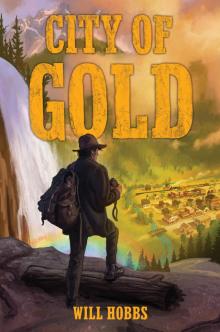 City of Gold
City of Gold Kokopelli's Flute
Kokopelli's Flute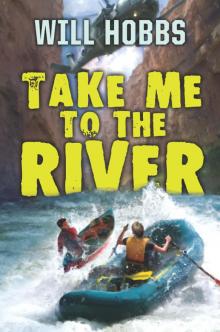 Take Me to the River
Take Me to the River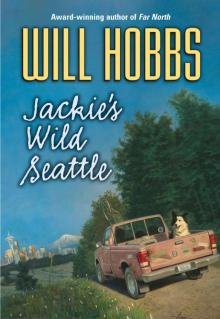 Jackie's Wild Seattle
Jackie's Wild Seattle The Maze
The Maze Ghost Canoe
Ghost Canoe Never Say Die
Never Say Die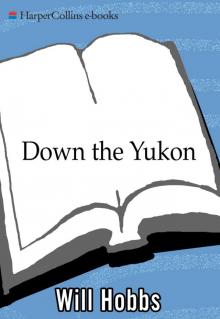 Down the Yukon
Down the Yukon Bearstone
Bearstone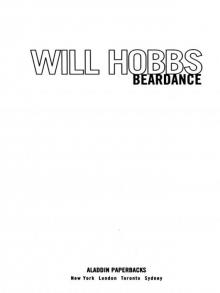 Beardance
Beardance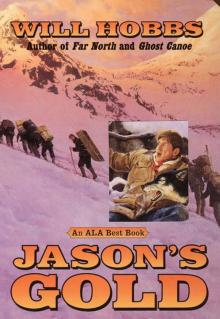 Jason's Gold
Jason's Gold Far North
Far North The Big Wander
The Big Wander River Thunder
River Thunder Downriver
Downriver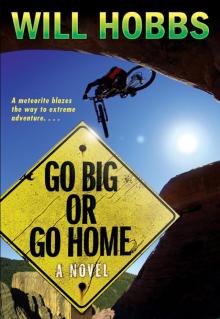 Go Big or Go Home
Go Big or Go Home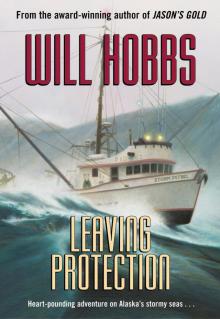 Leaving Protection
Leaving Protection Wild Man Island
Wild Man Island